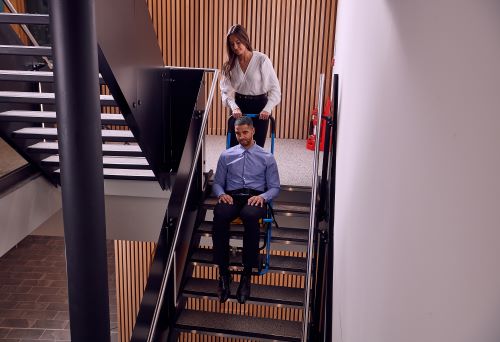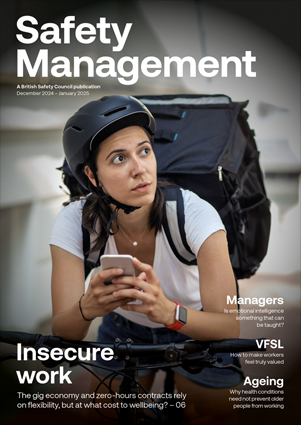Although many businesses are increasingly focusing on improving their sustainability and environmental performance, new research has found the majority of people at work believe these efforts will also have a positive impact on occupational safety standards.
Features
Sustainability and safety in business: finding the right balance
As the UK moves towards Net Zero, an ever-growing focus among businesses on sustainability and reducing environmental impact has resulted in the topic moving up the Board agenda in recent years.
At the same time, set against a backdrop of several years of heightened awareness of the importance of health and safety since Covid, the scope for potential conflict exists between the two agendas.
 The majority of people believe that sustainability can positively impact safety. Photograph: iStock
The majority of people believe that sustainability can positively impact safety. Photograph: iStock
It is perhaps not unreasonable to believe there may come a point where it’s a case of safety ‘versus’ sustainability around the Board table. And while historically, safety might have been considered a necessity and sustainability a ‘nice to have’, this is simply not the case any longer.
A growing focus in recent years on a myriad topics – such as ESG (environmental, social and governance, an acronym first coined in 2004 by the United Nations), Net Zero, BCorp and the Triple Bottom Line (the idea of people and planet being considered as equally important to profit) – mean that both sustainability and safety are now vitally important issues within business and wider society.
Despite potentially appearing to compete for share of voice – and resources – when it comes to the Board agenda, the two are perhaps more compatible than it might first appear.
After all, safety and sustainability policies are ultimately working towards the same objective – preserving resources: people and planet. The two are inexorably linked as the safety, health and wellbeing of employees is determined increasingly – and certainly in the long term – by sustainability goals being achieved.
Sustainable business practices
The US think tank, the Center for Safety and Health Sustainability, which has a global reach, representing 100,000 occupational safety and health professionals in more than 70 countries, has stated that businesses must consider the safety, health and wellbeing of workers as part of sustainable business practices, because it enables them to operate safely in work environments in the long-term.
Research conducted by Draeger Safety UK in early 2023 which examined attitudes to workplace safety, and associated topics, explored this topic.
It found that sustainability is more important to organisations than two years ago, with 75 per cent of those involved in the research stating that this was the case in the organisation they work within.
Furthermore, when it comes to competing agendas, along with cost reduction and productivity, sustainability is the most likely issue to be competing with safety as a business priority.
According to the research conducted by Draeger Safety UK in early 2023, things that are seen to be competing most with workplace safety as a business priority in organisations are:
- Managing/reducing costs (65 per cent – this is especially heightened in the transport industry)
- Productivity (57 per cent – especially heightened in the manufacturing sector)
- Sustainability/environmental improvements (46 per cent – especially heightened in the oil, gas and renewables industries).
Despite this competition, the majority of people (62 per cent) believe that sustainability can positively impact safety and the two can comfortably co-exist. Less than one in ten (eight per cent) think that the sustainability agenda negatively impacts safety and that they cannot co-exist.
 Dave Head: "The growing focus on people and planet as well as profit, clearly encompasses both safety and sustainability." Photograph: Drager Safety
Dave Head: "The growing focus on people and planet as well as profit, clearly encompasses both safety and sustainability." Photograph: Drager Safety
Workers’ views on safety and sustainability
An added consideration is how potential employees view a business’s approach to safety and sustainability topics. One might be forgiven for thinking that, in light of all of the recent media attention on environmental topics, this might be the foremost consideration for people exploring whether to work at any given business, but according to the research it is not. Employees are more likely to see safety as an important consideration in choosing an employer than sustainability, with 84 per cent saying that safety is an important consideration in choosing an employer compared with 70 per cent expressing the same view in relation to sustainability.
This view around the importance of sustainability is – perhaps unsurprisingly – most pronounced in the oil, gas and renewables industries (81 per cent), and least pronounced in the transport sector (62 per cent).
As the UK moves ever closer towards its 2050 Net Zero targets, it is clear that sustainability topics are only going to increase in importance and rise up the business agenda. And while this may initially have appeared to potentially threaten organisations’ focus on other areas such as safety, the research suggests otherwise.
The growing focus on people and planet as well as profit, clearly encompasses both safety and sustainability, and instead of being seen as competing areas, it’s more likely that they will come together under a similar, broader theme to be considered in tandem.
The report can be found at: draeger.com/Content/Documents/Content/DSAW23.pdf
Dave Head is head of safety marketing at Draeger Safety UK
FEATURES

Emergency evacuation for people with mobility issues: why we must do better
By Gerard Wallace, Evac+Chair International on 01 August 2023
With research revealing poor understanding among many businesses of their duty to have arrangements in place to safely evacuate mobility-impaired people, it’s time for the government to educate building owners about their obligations and mandate the provision of evacuation equipment, to ensure a safe evacuation for everyone.

Establishing a company culture of safety
By Driving for Better Business on 01 November 2024
Collision prevention takes growth mindsets, psychological safety and a ‘just’ culture, delegates at the recent National Highways ‘Driving Change’ conference heard.

Driver fatigue: always minimise the risk
By Driving for Better Business on 01 November 2024
Research shows that driver fatigue may be a contributory factor in up to 20 per cent of road incidents, and up to one-quarter of fatal and serious incidents.



